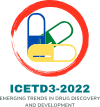Speaker
Description
Non-small cell lung cancer (NSCLC) is the leading cause of mortality in oncology, and EGFR-TK plays a critical role in this disease. As a result, EGFR-TK is a viable target for therapeutic development in NSCLC. The T790M EGFR TK mutation was resistant to both first-generation and second-generation (selectivity issue) EGFR TK inhibitors. Although third-generation drugs (Osimertinib) can overcome the EGFR T790M mutation, a recent C797S mutation makes these agents ineffective against it. All of the currently available EGFR kinase inhibitors target the kinase’s highly conserved ATP-site, underlining the need for therapeutics with a different mechanism of action (allosteric binding). EAI001, EAI045, JBJ-04-125-02, DDC4002, and a series of small compounds (fourth generation) having an affinity for the EGFR allosteric site have been discovered and are currently being investigated. To overcome EGFR T790M/C797S resistance, allosteric mutant-selective fourth-generation EGFR inhibitors look to be a promising treatment approach. We present the discovery, development, and structural characterization of allosteric mutant selective EGFR inhibitors based on an anilino pyrimidine scaffold. Our structure-based medicinal chemistry effort resulted in an inhibitor (3) of the EGFR (L858R/T790M) and EGFR (L858R/T790M/C797S) mutants with an IC$_{50}$ of 10 nM and good selectivity, as shown by kinome profiling. Further research into allosteric anilinopyrimidine inhibitors might pave the way for new treatment alternatives for targeting drug-resistant EGFR mutations.
